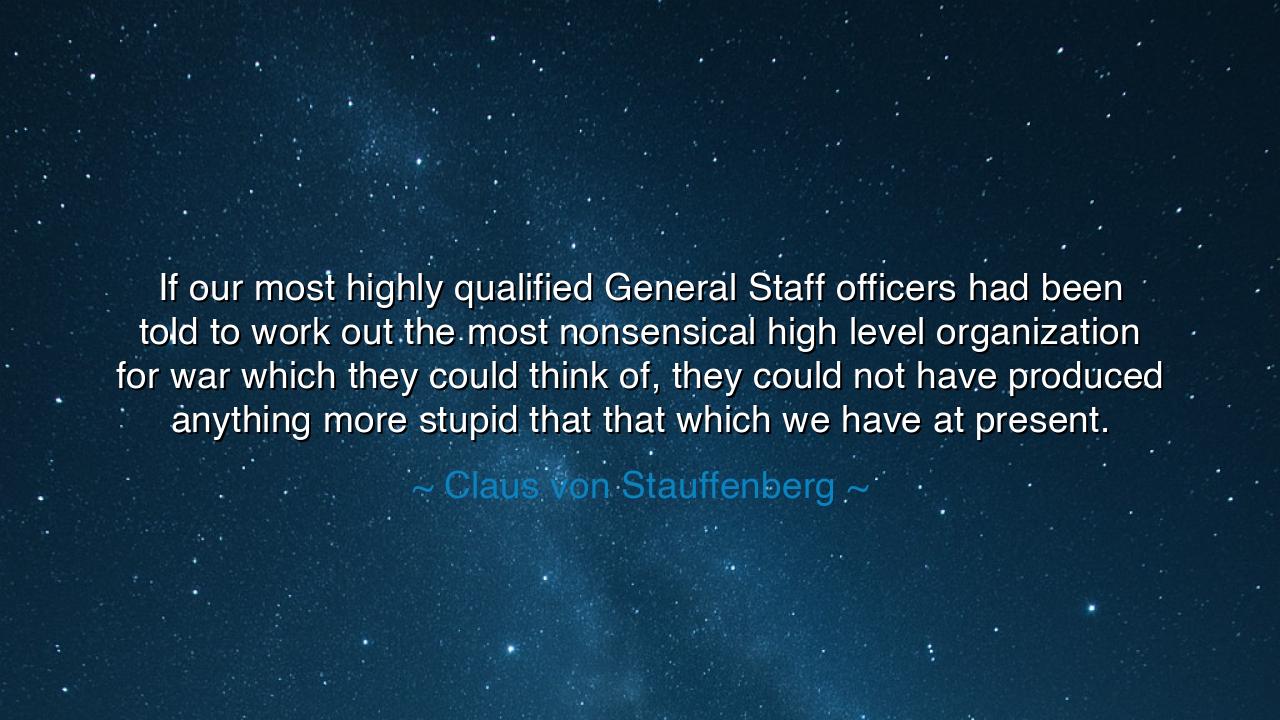
If our most highly qualified General Staff officers had been
If our most highly qualified General Staff officers had been told to work out the most nonsensical high level organization for war which they could think of, they could not have produced anything more stupid that that which we have at present.






The German officer Claus von Stauffenberg, a man who would later risk his life in defiance of tyranny, once declared: “If our most highly qualified General Staff officers had been told to work out the most nonsensical high-level organization for war which they could think of, they could not have produced anything more stupid than that which we have at present.” In these words, there is both scorn and sorrow. Scorn for the incompetence and corruption of the system he served, and sorrow because he knew that soldiers and civilians alike would suffer the cost of such folly.
The origin of this saying lies in Stauffenberg’s growing disillusionment during the Second World War. Once a loyal officer of the German army, he came to see that the military leadership, twisted by politics and poisoned by Hitler’s obsession with absolute control, had become paralyzed. Decisions were made not by logic or experience, but by ideology, fear, and arrogance. The carefully trained General Staff, once the pride of Prussia and Germany, was shackled, unable to lead effectively. What should have been a machine of discipline and reason had become a chaos of incompetence.
Stauffenberg, who loved his country but despised the regime that ruled it, understood that such “nonsensical organization” meant disaster. Battles were lost not only on the field but in the chambers of power, where poor planning and rigid command doomed soldiers to needless death. To a man trained in strategy, this was unbearable. His condemnation was not merely of inefficiency—it was a moral cry, for he saw that the stupidity of leadership multiplied suffering and prolonged the war unjustly.
History offers many mirrors to this truth. In the First World War, countless generals clung to outdated tactics, sending waves of men into machine-gun fire at the Somme and Verdun, producing mountains of dead for a few yards of ground. The soldiers called it madness, but to the generals it was “strategy.” Stauffenberg’s words echo across those trenches: when leaders are blind, even the most intelligent officers cannot save their people from ruin. The higher the level of incompetence, the deeper the pit into which nations fall.
But Stauffenberg was not content to curse stupidity; he acted against it. His disillusionment led him to join the July 20th plot of 1944, the desperate attempt to assassinate Hitler and overthrow the Nazi regime. Though the plot failed and Stauffenberg was executed, his courage remains a beacon. His statement about the absurdity of the high command was not idle complaint—it was the seed of resistance, born from the conviction that a broken system, if left unchecked, destroys all.
The deeper meaning of his words is this: leadership is not merely about command, but about wisdom. When structures of power become detached from reality, when arrogance and ideology silence experience, then even the most brilliant officers are rendered useless. The “nonsensical organization” becomes a death machine, crushing those beneath it. Stauffenberg reminds us that stupidity at the top is not harmless—it is catastrophic, measured in blood and ruin.
For us who live beyond his time, the lesson is sharp. In our workplaces, in our governments, in our communities, when we see structures built on nonsense, we must not stay silent. To endure them passively is to allow folly to grow until it devours all. Instead, like Stauffenberg, we must have the courage to call out incompetence, to strive for reform, and, if need be, to resist corruption even at great cost. For the fate of many always rests in the wisdom—or the foolishness—of a few.
Therefore, let this wisdom endure: do not accept “nonsensical organization” as unchangeable. Where you see folly, name it. Where you see arrogance, resist it. And where you see systems that destroy rather than protect, work to transform them. For as Stauffenberg knew, stupidity in high places leads only to ruin—but courage in the hearts of the few can yet preserve the dignity and future of the many.






MHNguyen Minh Hoang
This quote really challenges the idea of military efficiency. It’s striking how von Stauffenberg claims that even a 'nonsensical' system would have been better than what was in place. It makes me think about how much military leadership is bound by tradition and hierarchy. How often do outdated practices get in the way of true innovation or efficiency? Could we be underestimating the power of simpler, more adaptable strategies in warfare?
HHaMie
It’s hard not to feel the weight of this statement. If someone as qualified as von Stauffenberg believed that military leadership had failed so badly, what does that say about the systems in place during wartime? Is the failure of military leadership more about rigid systems than lack of intelligence or strategy? Could we be overlooking crucial reforms that might better equip military forces for modern conflict?
AKphan anh khoi
Von Stauffenberg’s frustration is palpable in this quote, and I can see why he would feel this way. The military’s top structures are supposed to be the best-prepared to handle complex scenarios, yet here he’s suggesting that they’re actually the most nonsensical. This raises a critical question—how do we balance experience with flexibility? Can military systems adapt quickly enough to meet the changing nature of modern warfare?
SDVan sinh DINH
This quote strikes me as a harsh criticism of military bureaucracy. Von Stauffenberg seems to be pointing out how even the most experienced and intelligent military leaders can sometimes end up with an illogical and inefficient system. It makes me wonder how much of modern warfare is shaped by outdated structures and inefficiencies. Are our current military organizations really the best we can come up with, or is there room for improvement?